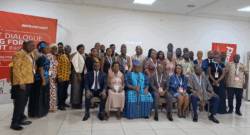Legal Practitioner and Senior Partner at AB& David Africa, David Fosu-Dorte has called on African governments to domesticate its purchases and procurement processes to boost Intra-African trade strategizes and minimize the negative economic impact of the COVID-19 pandemic.
“We could see Africa and some countries in Africa becoming an alternative base of the supply chain of some items. We may have to as African countries coordinate our response to COVID-19 in such a way that COVID-19 becomes an impetus for increasing Intra African trade rather than decreasing it,” he said.
Speaking on the Eye on Port Panel discussion on how national and international Trade and regional Protocols have been frustrated by the COVID-19, the lawyer, said the global consequences of COVID-19 should teach African nations a lesson to boost intra-African trade because the reliance on the West and the Far East has obviously proven not to be the best sustainable option.
He also indicated that the COVID-19 has significantly impacted the establishment of the African Continental Free Trade Agreement in various ways, including uncertainty surrounding the level of commitment of governments, and the closure of borders indicating a substantial reduction of intra-African trade volumes since the pandemic.
“Businesses on the continent are having stresses so you don’t expect them to ramp up production especially at a point they can’t export. So in the absence of open borders, in the absence of free movement, definitely, all these are going to affect the ability to produce, and even when the restrictions are lifted I expect that it will affect our trade,” he noted.
David Fosu-Dorte stated that he would propose that the implementation of the AfCFTA should be on schedule, as it would ensure nations prepare themselves towards strategizing their industries.
The Secretary-General of the International Chamber of Commerce, Ghana, Emmanuel Doni-Kwame, on the same panel, urged the private sector to participate in an ongoing survey that seeks to gather data about the frustrations associated with the restrictions caused by the COVID-19 and enable authorities fashion out practical remedies.
“We developed it together with the WHO and we picked a simple questionnaire that looks at the impact of pandemic on your supply chain and it gives the necessary feedback on how the private sector can help reduce its effect,” he noted.
He called on Ghana’s commercial banks to augment cashless systems, so that the inefficiencies that have emerged from the banking systems due to the COVID-19 would be resolved.
“My worry is to see the long queues at the banks because we were keen in setting up the paperless regime at the ports also developing and creating a cashless economy. So we expect the backs to address that issue,” he said.
Emmanuel Doni-Kwame emphasized the need to dialogue between traders and shipping service providers, but also encouraged members of the trading public, to engage all legal clauses within the contracts that could be applied in order to explore the reliefs.
“We are in different times. You need to notify your parties you have a contract with them and you need to check if you have a Force Majeure clause in the contract. Once you have a Force Majeure clause, you also have to check if pandemics are listed in there,” he advised.
However, David Fosu-Dorte, the Legal Practitioner said businesses and individuals should be circumspect in seeking to hide behind legal doctrines like frustrations and force-majeure clauses but rely on legal advice for any such action since reliance on such principles are based on facts of each case.










